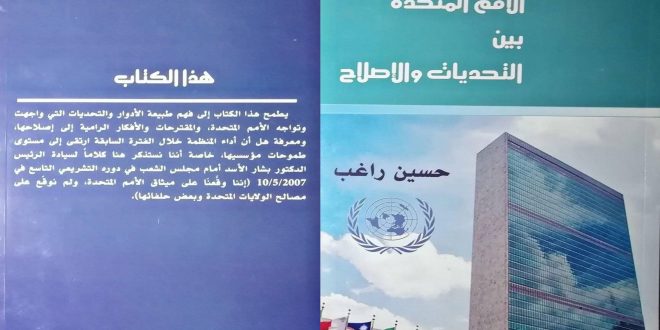“United Nations challenges and reform” book provides comprehensive overview of this global institution
The book “The United Nations between Challenges and Reform”, authored by researcher Hussein Ragheb, provides a comprehensive overview of this global institution that has been established since 1945, starting from its founding stages. The book includes an introduction to the UN bodies, institutions and roles based on maintaining international peace and security, the challenges it faces and its need for reform.
The book, which contained four chapters, relied on methodological readings that present an objective vision of intellectual proposals for the purpose of reforming the UN. It also included raising questions about whether this organization has reached politically, culturally and globally to the level of the aspirations of its founders.
In the introduction to his book, Ragheb states that what made him write it was the attempts of the United States and its allies to turn the United Nations into the spearhead of the war on Syria, believing in the continuous proposals of the Syrian state to demand the need to reform this organization, its bodies and agencies in order to establish democratic relations between states.
In this book, Ragheb briefed the readers on the historical development that preceded the founding of the United Nations when it was still ideas and proposals by politicians and thinkers. He sheds light on its legal nature, principles and main bodies, namely: the General Assembly, the UN Security Council, the Economic and Social Council, the Trusteeship Council, the International Court of Justice and the General Secretariat.
Through a chapter entitled “The Main Roles of the United Nations”, Ragheb highlighted its roles in the fields of world peace and human rights. He dedicated a chapter on the contemporary global challenges it is facing.
Ragheb dealt in great detail with one of the most serious issues facing the United Nations, which is nuclear armament, and the repercussions on countries that possess nuclear weapons, and the pretexts that some countries use to deploy this weapon.
The book focuses on the efforts of some countries to fuel separatist tendencies for the fragmentation of states in implementation of special interests.
The book also discusses the role of the UN in curbing the threats of epidemics that threaten human life in our time, confronting terrorism and achieving international peace and justice.
In his book, Ragheb also tackled the culture of the environment, the dangers and problems of environmental security, the importance of the United Nations’ participation in combating environmental changes, in addition to the conferences, protocols and challenges taking place in this framework.
Ragheb devotes the last chapter of the book to the issue of reforming the United Nations, indicating the necessities of this issue and the need of amending its charter approved in 1945 and the efforts of the American administrations to impose control over it and conduct its decisions in accordance with their interests.
It is noteworthy that the book was issued by the People’s House for the dissemination of human sciences.
Inas Abdulkareem

